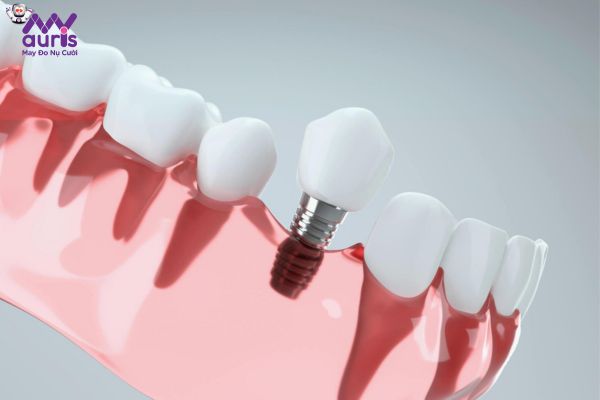Painless dental implants are currently the best method of restoring lost teeth on the jaw, recommended by most specialized doctors. However, with this option, the doctor must perform surgery that affects the jaw bone. Therefore, many patients are still worried about whether this method will cause pain during the procedure. Details will be answered by My Auris dentistry through the following deciding factors!
Find out what painless dental implant method is?
The painless dental implant method is a trend in aesthetic tooth restoration highly appreciated by doctors. During the procedure, the doctor drills into the gum to insert a titanium implant to replace the lost tooth root. Dental implant surgery is a complete healing process over several months. Much of this time is spent waiting while the doctor and patient work together to ensure the expected results.

- First, the doctor makes an incision in the gum, then places the Implant into the jawbone with a screw to replace the lost tooth root.
- Next, after placing the implant, it is necessary to leave some time for the bone and implant to integrate stably. During the waiting period, the patient will be fitted with temporary dentures so that they can eat, drink and communicate as normal.
- Finally, after a period of good integration, the implant has healed. Doctors will proceed to place permanent porcelain teeth into the root posts to complete safe dental implant techniques.
Is it true that implants are painful or not?
According to specialist doctors, painless dental implants are understood as the procedure will not cause too much discomfort to the patient, because the doctor anesthetizes the patient before going into the treatment process.

After the implant is placed, the patient may feel a slight swelling and pain in the implanted area for a few days, but you don’t need to worry too much because it won’t last too long. In fact, if you choose the right dental facility to perform dental implants, the technique will be painless and ensure good safety. You can safely proceed with restoring lost teeth, because:
- During the dental implant procedure, the patient will be anesthetized or given local anesthesia. Therefore, you will not feel pain. After the anesthetic wears off, customers may feel pain or mild discomfort within the first 3 days.
- Furthermore, the operation of opening the gum flap and jawbone is supported by machines equipped in modern, advanced dentistry. All are guaranteed to be accurate down to the millimeter, being able to accurately determine the appropriate location for the abutment, limiting damage or invasion to a minimum. From there, it does not have much effect on the gums and jawbone.
- The Implant is specially designed, with the ability to quickly integrate with the jaw bone area. This will help the wound heal quickly without causing discomfort. People can still eat and drink as normal, with a scientific diet after implantation.
Factors affecting the level of pain after implant placement
According to experts, painless dental implants will live up to its name – Does not cause pain to the patient because the doctor previously anesthetized the patient. After the procedure is completed, the patient may experience slight swelling and pain in the area where the implant was performed for the first few days, and it will not last too long.

However, the more or less painful dental implant placement will still be affected by certain factors.
- Number of teeth that need to be restored: For people who have to have many dental implants done at the same time, or even the entire jaw, pain is inevitable. At this time, the patient needs to consult and follow the doctor’s instructions to safely reduce pain and not cause harm to health.
- Location to be implanted: If dental implant is near the position of the wiresnerves and jaw, the pain will be felt more clearly.
- Skills of doctors: This is the most important factor, directly determining the success of a dental implant case. If the prosthodontist is highly skilled and has a lot of practical experience, he will help place the dental implants and restore the teeth accurately. At the same time, it does not cause complications and limits pain for you, avoiding rejection as well as causing discomfort to the patient.
- Modern types of equipment and machinery: Doctors’ skills are not enough without the support of modern, advanced machinery. Because dental implants always require high precision. When the doctor has maximum support from machines, it can help the patient feel more secure because they no longer feel pain.
Some notes to help reduce pain after implantation Implant
In addition to the above factors, the body is also one of the important factors that affect the painless dental implant process according to each person’s perception. Effective oral care and hygiene helps protect and effectively shorten restoration time. Here are some notes after implant placement to help ensure effectiveness that you should know:

- Absolutely do not rinse your mouth with salt water after placing the implant. Because diluted salt water has high bleaching properties, it can wash away or kill new cells that are forming, causing the healing process to take longer.
- Oral hygiene should be done with soft tools, gentle movements and do not rub too hard on the newly planted abutment and mucosa.
- Patients should not smoke cigarettes, beer, alcohol and other toxic substances for 4 to 8 weeks after implant placement.
- Absolutely do not use your hands, and limit the use of your tongue to touch the wound.
- Avoid vigorous exercise, to avoid impact and shaking of newly planted posts.
- Avoid eating hard, hot foods, etc.
- Do not arbitrarily use antibiotics and pain relievers without the consent and instructions of your doctor.
- You should add plenty of water because it will help clean the oral cavity and reduce the feeling of discomfort when the implant is first placed.
- You should eat soft and thin foods such as porridge, soup, milk,…
- Follow the instructions of your specialist, and have regular follow-up appointments so the doctor can check and assess the condition most accurately.
On This is information related to the painless implant method. In fact, the level of pain after dental implantation will be within the patient’s tolerance and control. On the other hand, the procedure is also anesthetized by the doctor, avoiding discomfort for the patient. Therefore, you should find and visit reputable dental facilities for safe treatment. for you today!
Yen Nhi





